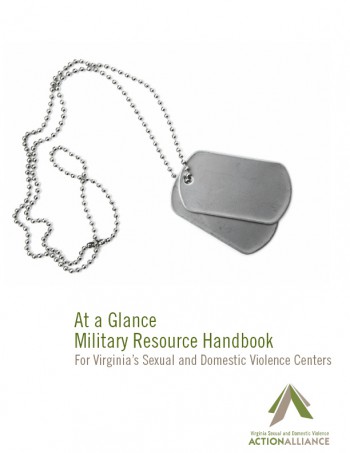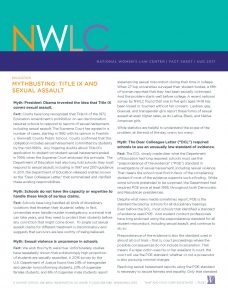Resources Library: Publications/Reports
Start a Search:
Military Resource Handbook for Virginia’s Sexual and Domestic Violence Centers

A comprehensive handbook for Sexual and Domestic Violence Agencies who may be working with victims/survivors serving in the military. Includes Department of Defense policies on sexual and domestic violence, reporting procedures, tips for collaboration between civilian and military organizations, sample safety plans, and additional resources.
Published by Virginia Sexual & Domestic VIolence Action Alliance.
January, 2008.
60 pages.
Mistreatment of Marginalized Elders
The National Center on Elder Abuse (NCEA) has developed Research Briefs to help practitioners, students, and researchers access recent and past research studies and highlights of findings on how elder abuse impacts various marginalized communities. View each research brief below for more insight into these areas, and ways to combat this complex experience of violence.
Model Protocol on Services for Limited English Proficient Immigrant and Refugee Victims of Domestic Violence
The Washington State Coalition against Domestic Violence (2002) created a model protocol for the state of Washington with the goal of supporting domestic violence agencies to increase and extend their services to immigrant women whose first language is not English. Included in the protocol are recommendations for agency policies and procedures, specifically how to conduct intake, provide crisis intervention, facilitate accommodating shelter experiences, legal advocacy, and more.
National Women’s Law Center - Mythbusting Title IX and Sexual Assault

Nearly one in five undergraduate women experience sexual assault or attempted sexual assault while in college, as do too many men and gender non-conforming students. Title IX of the 1972 Education Amendments requires that schools prevent and respond to reports of sexual harassment, including rape, to ensure survivors can continue to learn in the wake of violence. Despite significant evidence to the contrary, some critics argue that survivors of sexual misconduct on college campuses have too many rights. Myths like these are inconsistent with the law and ignore the real experiences of students subjected to sexual harassment. Below are other myths and facts about sexual assault and Title IX.
New Report Available from the Family and Intimate Partner Homicide Surveillance Project
The Office of the Chief Medical Examiner in the Virginia Department of Health has issued a new report from the Family and Intimate Partner Homicide Surveillance Project, Family and Intimate Partner Homicides in Virginia’s Cities and Counties: 1999-2013.
The year 2013 marked the fifteenth year of data collection by the Family and Intimate Partner Homicide Surveillance Project. This report examines the burden of domestic violence related homicides in Virginia over that time period. The main body of the report gives an overview of trends and disparities in the impact of fatal domestic violence through the lens of place and locality using maps, figures, and geographic divisions. Report appendices contain extensive look-up tables detailing the impact of these deaths at the level of city/county for the entire fifteen-year surveillance period, to support local and regional efforts to respond to and prevent future fatalities.
This and other reports are available here.

